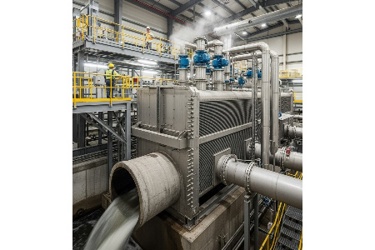Wastewater Heat Exchanger Market To Hit $2.8B By 2033

Market Summary
According to Research Intelo, the Wastewater Heat Exchanger market size was valued at $1.2B in 2024 and is projected to reach $2.8B by 2033, expanding at a CAGR of 9.7% during the forecast period of 2025–2033.
The rising demand for sustainable energy solutions has fueled the growth of the wastewater heat exchanger market. By capturing thermal energy from wastewater streams and repurposing it for heating or cooling applications, these systems reduce both energy consumption and greenhouse gas emissions. The technology is increasingly gaining attention across industrial, municipal, and residential sectors.
Market Dynamics
Key Drivers
- Energy Efficiency Initiatives – Governments worldwide are pushing energy-saving technologies, and wastewater heat exchangers align perfectly with these goals.
- Urbanization and Infrastructure Growth – As cities expand, large volumes of wastewater are generated, creating significant opportunities for heat recovery.
- Cost Savings – By reducing dependence on traditional heating systems, users benefit from long-term operational cost reductions.
Market Restraints
Despite the benefits, adoption faces hurdles such as:
- High initial investment costs.
- Complex installation processes.
- Limited awareness in developing economies.
Opportunities Ahead
- Integration with district heating and cooling systems.
- Use in data centers to manage thermal loads.
- Rising focus on circular economy practices in industries.
Market Segmentation
By Type
- Plate Heat Exchangers – Known for compact design and efficiency.
- Shell and Tube Heat Exchangers – Preferred for large-scale industrial applications.
- Others – Includes spiral and hybrid systems.
By Application
- Municipal Wastewater Treatment Plants – Harnessing energy at scale for public utilities.
- Industrial Processes – Manufacturing, chemical, and food industries use recovered heat for internal operations.
- Residential & Commercial Buildings – Adoption in green buildings to reduce heating costs.
Competitive Landscape
The market is moderately fragmented, with both global players and regional manufacturers contributing to growth. Companies are focusing on technological innovations, partnerships, and pilot projects to showcase efficiency. Many are also investing in smart monitoring systems to improve long-term performance.
Top companies in the wastewater heat exchanger market include Alfa Laval AB, Xylem Inc., Kelvion Holding GmbH, HRS Heat Exchangers, and GEA Group AG.
Future Outlook
The wastewater heat exchanger market is poised for robust growth over the next decade. With rising awareness of climate change and the push toward net-zero targets, the demand for efficient energy recovery solutions will continue to expand. Integration with smart cities, green building projects, and renewable energy systems will further drive adoption.
Source: Research Intelo
